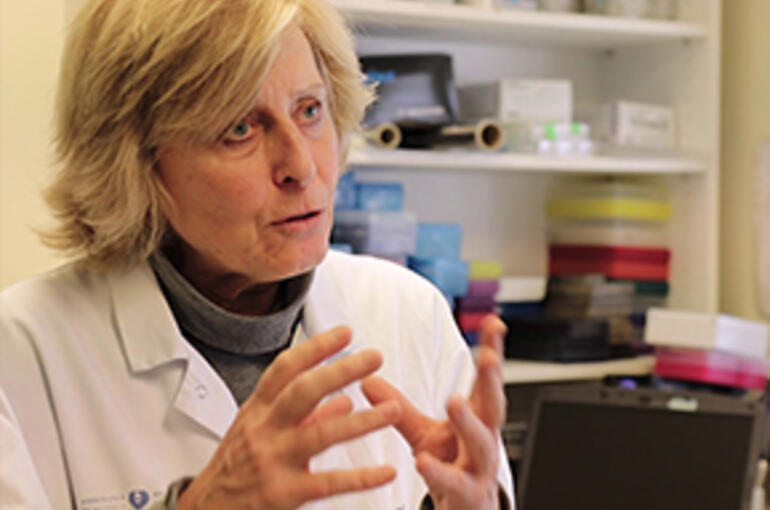Improving HIV care and patient access to Life insurance (part 1)
HIV continues to be a major global public health issue, despite great medical progress in terms of diagnosis, treatment and prevention.
December 2, 2019

Eric Raymond, Professor of Medical Oncology and Medical Director at SCOR Global Life, discusses the evolution of HIV and treatments with Professor Brigitte Autran, who has devoted her career to HIV infection and has recently developed research into a vaccine against the condition.
Dr Raymond (DR)
We would like to ask you a few questions about HIV, which remains a major global issue despite new treatments and prevention. Could you tell us which countries and populations are currently most vulnerable to HIV?
Pf. Autran (PFA)
This question is regularly reviewed by the WHO (World Health Organization). We will soon have the announcement for 2017, but as far as we know from the 2016 statistics, the populations most infected by HIV remain the Sub-Saharan populations. However, one thing of real concern is the increasing incidence of HIV in eastern Europe and in the old Soviet Union countries. These are the countries where incidence is continuously rising. There are also some countries in South America which might remain at high risk, such as Chile, but everywhere else in the world the incidence is slowly decreasing.
DR
What are the current strategies to contain HIV infection around the world?
PFA
We have a wonderful strategy which is based on treatment!
Treatment has really revolutionized HIV infection. We have gone from an infection that killed every patient, with almost 100% or 99.99% mortality, to almost zero mortality if the treatment is taken properly. And we know that the survival of patients with good treatment is normal. So, treatment is the basis for the prevention of HIV, given that there is unfortunately no vaccine. Treatment is used to contain the epidemic in two ways: the first, which is strongly recommended by the WHO, is to treat everybody, as early as possible. The WHO calls this strategy 90-90-90: diagnose 90% of infected people, treat 90% of these diagnosed individuals, and observe control of the virus in 90% of treated individuals. The WHO has calculated that we should eradicate HIV by 2030. The other strategy is to prevent the transmission of HIV to uninfected individuals, not only by treating patients who are already infected so that they can no longer transmit the virus, but also by treating people who expose themselves to HIV contamination.
DR
How important do you think universal health coverage is in the fight against HIV?
PFA
Universal health coverage is part of the strategy to contain the HIV epidemic, since we need to deliver treatment to everybody. So, in principle, all countries have agreed to provide free access to treatment, but the access is very different from country to country. The organization of health systems is a major issue and generates inequalities in terms of access to treatment.
DR
There is a strong relationship between HIV and Cancer – HIV reduces immunity, facilitating the development of cancer. Nowadays there is a lot of data on treatments designed to stimulate immunity in order to fight cancer. What do you think about the mechanism of these new treatments? How do they stimulate the immune system?
PFA
It’s like the tumor is debilitating the immune system internally; it’s really a fight between the tumor and the immune system.
So, the immune system is blocked in the tumor because of these immune checkpoints. The beauty of the latest immunotherapy is that it has found a way to unblock the immune system by treating the patients with antagonists, with antibodies that block the blockers. So, by blocking the blockers you unblock the immune system and you provoke a rejection of the tumors.
We know that remission is obtained in at least half of cancers, but importantly in half of cancers that have already resisted chemotherapy. So it complements the effect of chemotherapy. All in all, depending on the cancers, the success rate for the treatment of cancer has increased from 25 to 30% to 70%. It’s really incredibly successful.
DR
When you talk about efficiency, is this really curing patients, or does it really only provide symptomatic improvements?
PFA
It’s not just symptomatic improvements, it’s obvious that the tumors are reduced, the tumor sizes are reduced, the numbers of metastases are reduced, the number of relapses are reduced. So it’s not only symptomatic - it’s a true anti-tumoral effect.
DR
Many cancers are currently treated with chemotherapy, which is also associated with a lot of side effects. Will immunotherapy replace chemotherapy, or do you think they will form a kind of combination that will win against cancer?
PFA
Normally immunotherapies are not used as first-line therapy. For the majority of cancers, chemotherapy remains the recommended first line of treatment. But in some situations, such as such lung cancers, it is now recommended to start with immune-based therapies.
But immunotherapy generates its own side effects, which is understandable – the therapy resuscitates the immune system so that it can fight the tumor, but it does not specifically target the tumor, it acts on the whole organism.
About the authors
Professor Autran is the Director of the Immunology Department and the Medical Biology and Pathology Hub at the Pitié-Salpêtrière Hospital in France, where she leads the "Anti-viral and Vaccinal Immunity and Immunogenetics" research team.
Eric Raymond is a Professor of Medical Oncology at Paris Saint-Joseph Hospital and a Medical Director at SCOR Global Life. He is Board-certified in Medical Oncology and has a PhD in Cellular and Molecular Biology. Professor Raymond is a former Professor of Oncology at the University of Paris VII, the former Chair of Medical Oncology at Bichat-Beaujon University Hospitals, Clichy, France and a former Professor of Medical Oncology at CHUV/UNIL in Lausanne, Switzerland.